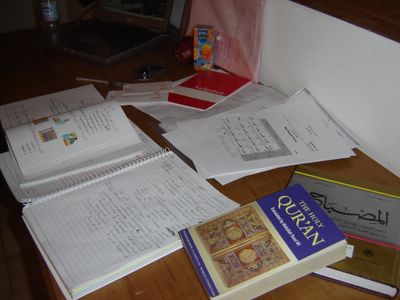Youssef Ali hits a Roxbury 7-Eleven

Drowning in Arabic, once more, enjoying it. I think I finally may have transcended the elusive "threshold" of Arabic learning--and something "clicked," as I am often told happens. It is difficult to explain, but it is a sudden surge of empowerment and realization this is no longer harder than learning another Romance language. Which is thought provoking, as once one deconstructs down to the skeletal level of beginning a language, you start noticing things aside from common declensions and grammer. Cultural things. Across all languages. A very bleak, black and white, prejudice laced and psychologically rigid picture is formed in the commencement of a language. What are the first items one learns?
Their name. Their nationality. Their address and home. Their level of education. Their travel experience. Their occupation. Tell me this is not racial and socio-economic chess. The grainular and superficial reign supreme when beginning a new language. By speaking the facade of your identity, you are faced with the task of re-evaluating that which we idealistically deem irrelevent in the broader picture of humanity.
You learn big and small. Hot and cold. In and out. Man and woman. First class and economy. Beautiful and ugly. Good and bad. Every day, our teachers walk in and ask us how we are, and every single day, we sit and say "good, thanks be to god." Because that's what you say, and in many cultures, unless your arm is ready to fall off or something, you always say "fine."
Our textbook is centered upon an Egyptian man by the name of Youssef Ali, who is studying Arabic in Khartoum (Sudan) and has Sudanese heritage, once worked as a manager in a food market, drives a Peugeot, dresses in only blue, never received an education beyond high school and has a wife and grown son. It's very bizarre. And in the first lesson, he is contrasted with a Lebanese teacher and Egyptian engineer.
It's immensively constrictive, and expanding upon the gray is nearly impossible now, and may be for some time. And despite our collective enlightenment, we are lessoned at the elementary level in unrealistic clarity and perfection. Perhaps words of ambiguity, reticence, mediocrity, uncertainty, multi-racialism, creativity or internal psyche would be more adequate.
And yet again, it brings you back to a blissful state of naivite. You are granted the opportunity to discard all that is perplexing and quarrelsome and return to so-called basics.

4 Comments:
What are the things particular to Arabic that made you think along these lines?
I think it goes beyond Arabic.
I've studied many other languages, and I have thought about this in the past, now I have a forum I suppose. In Arabic, perhaps it is more pronounced to the relative lack of a middle class or diversity at times. There are the extremely (oil) wealthy Arabic speakers, a smattering of intellectuals and businessmen, and everyone else.
And for political and religious reasons, Arabic makes it more interesting. In part because adjectives as we know them in English don't exist in Arabic. They are transformed nouns. Beauty is beauty. Just now applied differently. Universally.
Hmmm, I wonder why he only dresses in blue?
It's so strange. Blue cap. Blue trousers. Blue shirt. Blue shoes. I'll have to take a photo and post it.
Post a Comment
<< Home